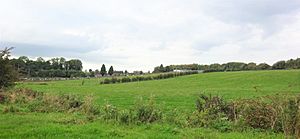Battle of Mauchline Muir facts for kids
Quick facts for kids Battle of Mauchline Muir |
|||||||
|---|---|---|---|---|---|---|---|
| Part of the Scottish Civil War | |||||||
 Mauchline Muir battle site |
|||||||
|
|||||||
| Belligerents | |||||||
| Engagers Party | Kirk Party | ||||||
| Commanders and leaders | |||||||
| John Middleton James Livingstone |
John Campbell | ||||||
| Strength | |||||||
| 800 infantry 1,200 cavalry |
850 cavalry | ||||||
The Battle of Mauchline Muir was a fight that happened on June 12, 1648. It was between two groups of Scottish Covenanters who had different ideas. One group supported a deal called "The Engagement." They were known as Engagers. The other group was against this deal and was called the Kirk Party. This battle was part of a bigger conflict known as the Scottish Civil War.
Background to the Battle
By 1646, the Covenanters, who were mostly Presbyterians, had beaten the Scottish Royalists. The Royalists wanted to stay loyal to King Charles I without any conditions. In 1646, at the end of the First English Civil War, King Charles I gave up to the Scottish army. This army was in England helping the English Parliament.
As part of a deal, the Scots handed King Charles over to the English Parliament. Then they went back to Scotland in 1647. Many groups were trying to decide how the country should be run. These groups included King Charles, the English Parliament, and a powerful army group called the Independents. King Charles tried to delay things. He hoped his supporters could help him get his throne back with few changes.
In December 1647, some Covenanters made a secret deal with King Charles. This deal was called The Engagement. In it, Charles promised to support Presbyterianism in England for three years. In return, the Covenanters would help him with their army.
However, another group of Covenanters, called the Kirk Party, were against this deal. They were strongly influenced by Archibald Campbell, 1st Marquess of Argyll. They opposed it because King Charles refused to personally agree to the National Covenant. They worried he would not keep his promise if he became powerful again in England.
By 1648, the Engagers had more power in the Scottish Parliament. They decided to send an army south. This army was led by James, Duke of Hamilton. Their goal was to make the secret deal happen. England was also having its own conflict, the Second English Civil War. So, the Scots thought English Royalists might help them.
The Battle Itself
In June 1648, members of the Kirk Party gathered in Mauchline. They were there for a special religious celebration that lasted several days. After the celebration, about 2,000 armed Kirk Party supporters met on Mauchline Moor. They chose leaders, getting ready to show they were unhappy with The Engagement.
Suddenly, five groups of soldiers loyal to the Scottish Parliament and The Engagement rode into their midst. These soldiers were led by John Middleton, 1st Earl of Middleton and James Livingstone, Earl of Callender.
The Kirk Party supporters had seven ministers with them. These ministers managed to get a promise from the Engager leaders. The promise was that if the Kirk Party group surrendered, they would not be punished. But most of the Kirk Party members did not agree to these terms. Many wanted to fight. Also, about 200 of them were soldiers who had left their posts, and they would not be included in any pardon.
For a while, the Kirk Party supporters fought well. But then, more Engager troops arrived, doubling their numbers. This decided the battle. Even though the Engagers won the day, both sides lost about the same number of people. It is thought that between 30 and 40 men died in total. All seven ministers and 65 members of the Kirk Party were arrested. However, they were later set free.
What Happened Next
Even though the Engagers won this small battle, it actually made more Scots oppose The Engagement. A couple of months after this victory, the main Engager army, led by James Duke of Hamilton, was badly defeated. This happened at the Battle of Preston by the New Model Army.
After a short civil war in Scotland, the Kirk Party became the winners. (You can read more about this in the Whiggamore Raid, the Battle of Stirling, and the Treaty of Stirling). Later, a Scottish Parliament met in Edinburgh on January 4, 1649. This Parliament officially "approved the opposition" of those who had fought at Mauchline.
 | Valerie Thomas |
 | Frederick McKinley Jones |
 | George Edward Alcorn Jr. |
 | Thomas Mensah |

